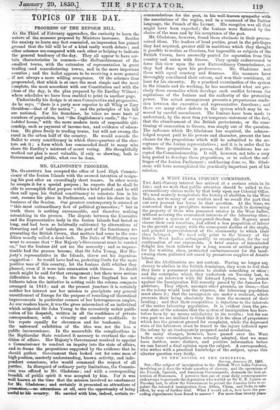TOPICS OF THE DAY.
PROGRESS OF THE REFORM BILL.
.As the Third of February approaches, the curiosity to learn the nature of the measure proposed by Ministers increases. Besides the anxiety to learn any fact concealed, an impression has gained ground that the bill will be of a kind really worth debate ; and other schemes are compared with each other as helping to indicate the general tendency of the day. They all appear to have cer- tain characteristics in common—the disfranchisement of the smallest towns, with the extension of representation in great trading -and manufacturing towns, and in the more important counties ; and the ballot appears to be receiving a more general if not always a more willing acceptance. Of the schemes thus propounded, that which is at once the most simple and the most complete, the most accordant with our Constitution and with the ideas of the day, is the plan prepared by Sir Eardley Wilmot; whose schedules we have been enabled to print in another page.
Undoubtedly his design is at once Conservative and progressive. As he says, "there is a party now superior to all Whig or Tory thraldom—that of the nation" ; and the principles of his bill are national. For his franchises, he takes no mere basis of numbers of population, but "the Englishman's castle," the "in- habited house," with the more modern tests of responsible qiti- zenship, such as payment of income-tax, and evidence of educa- tion. He gives freely to trading towns, but will not swamp the rural in the urban half of the country. He would concede the Ballot to every constituency in which three-quarters of the elec- tors ask it ; a form which has commended itself to many who share Sir Eardley's mistrust of secret voting. His thoughtfully worked out plan is most valuable, if only as showing, both to Government and public, what can be done.


























 Previous page
Previous page